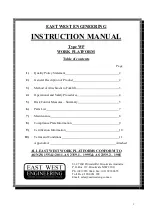
Two-Stage Mast
4000 SRM 764
Legend for Figure 4
A. POSITION 1
B. POSITION 2
C. REAR VIEW HOSE ROUTING
- LIFT
1.
ELEVATING MAST
WELDMENT
2.
STATIONARY MAST
WELDMENT
3.
MAIN LIFT CYLINDER
A. LOCK PLATE
B. RETAINER
4.
CHAIN ANCHOR
5.
CHAIN SHEAVE ASSEMBLY
(RH)
A. CHAIN SHEAVE
B. BALL BEARING
C. SNAP RING
6.
MAIN LIFT CHAIN
7.
LOAD ROLLER
8.
FLOW REGULATOR HOUSING
9.
HYDRAULIC TUBE (MAIN
LIFT)
10. HYDRAULIC HOSE (MAIN
LIFT)
11. TRUNNION STUB SHAFT
12. TO TRUCK CONTROL VALVE
2.
Remove the snap rings and washers from the
top of each lift cylinder. Use a pry bar to move
the inner mast weldment approximately 152 to
305 mm (6 to 12 in.) out from the top of the
outer mast weldment.
Remove the chain and
hose sheaves.
3.
Install a sling near the center of each channel of
the inner mast weldment so it will be balanced.
The slings must pass through the loop at the end
of the sling so the sling tightens and does not slip
on the channel as the weldment is lifted. Fasten
a crane to the slings.
4.
Use the crane to move the inner mast weldment
out of the outer mast weldment. Move the mast
weldment until the bottom rollers of the inner
mast weldment touch the top rollers of the outer
mast weldment. Use the crane to raise the top
of the inner mast weldment so it is at an angle
of approximately 30°. Lift the weldment straight
up to remove the inner from the outer mast weld-
ment. Put the weldment flat on the floor so it
cannot fall.
5.
Clean the area at the hydraulic fittings for the
lift cylinders. Disconnect the fittings. Put caps
on the open fittings and cylinder port to prevent
dirt from entering the system. Remove the snap
rings at the bottom of each cylinder.
6.
Install a sling near the center of the lift cylin-
der in the same manner used for the mast weld-
ment removal.
Remove the capscrew, washer,
and spacer that fastens the cylinder to the outer
mast channel. See Figure 3. Use the crane to
move the cylinder from the base hole and remove
the cylinder from the mast. Repeat the procedure
to remove the other cylinder.
7.
Remove the snap rings from the lower and upper
load rollers. Make a note of the shim arrange-
ment as each load roller is removed. The shim ar-
rangement will be approximately the same when
the mast is assembled.
8.
Remove the strip bearings from the outer mast
weldment. Make a note of the shim arrangement
during removal of the strip bearings for correct
installation during assembly.
9.
Disassemble the sheaves and rollers as necessary
for repair and cleaning.
CLEAN AND INSPECT
NOTE:
These cleaning and inspection procedures ap-
ply to both the two-stage and three-stage masts.
CAUTION
Do NOT use steam to clean the lift chains,
sheaves, or load rollers.
The sheaves and
roller bearings are sealed and permanently
lubricated. Do not use compressed air on the
bearings. The air can force the lubricant out
of the bearings.
Follow the manufacturer’s
instructions when using solvent.
1.
Wash the lift chains with solvent.
Use com-
pressed air to dry the chains. Inspect the chains
for wear and damage.
2.
Inspect the lift chains for cracks or broken links
and pins. Check for corrosion or worn holes in the
links. When the pins or the holes wear, the chain
becomes longer. The chain links that run over the
chain sheaves have the most wear. If a chain is 3
percent longer than a new chain, the chain must
be replaced. If a chain scale is available, check
the lift chains as shown in Figure 5. If a chain
scale is not available, measure 20 links of chain.
Replace the chains if the increase in length is 3
percent or greater.
8






























